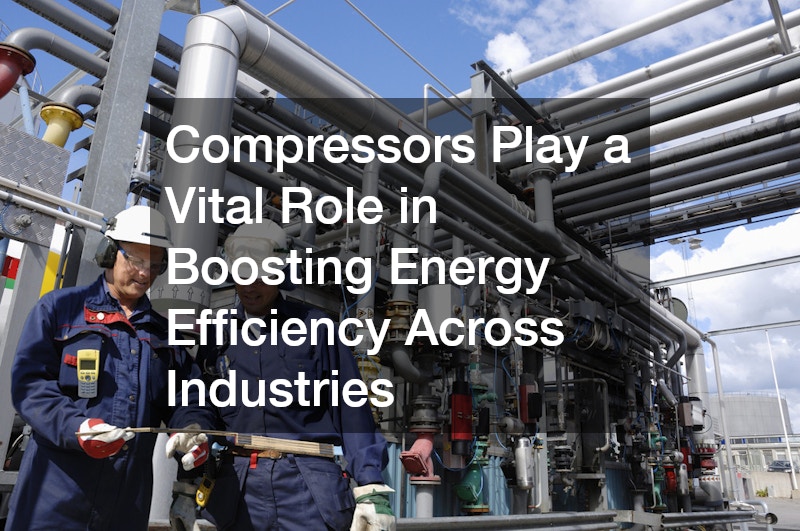In the quest for energy efficiency, compressors play a crucial role in many industries and applications. Their impact on the efficiency of heating, cooling, and air systems cannot be overstated. This article explores the importance of compressors in achieving sustainable energy management and reducing environmental impacts. Compressors not only optimize energy use but also help in minimizing carbon footprints, supporting industries’ sustainability targets.
By implementing modern compressor technology, firms can vastly improve their operational efficiency and cut down on energy costs. The use of compressors thus represents a strategic approach to reinforce energy conservation efforts across various sectors.
1. How do compressors contribute to energy savings?
1.1 The basic principles of compressor operation
Understanding how compressors work is essential to recognizing their role in energy savings. Compressors increase the pressure of gases, impacting the efficiency of energy systems.
Compressors operate by mechanically squeezing a gas into a smaller volume, thereby increasing its pressure. This process is fundamental in numerous applications, such as refrigeration, where temperature regulation is energy-intensive. By increasing the gas’s pressure, compressors enhance the thermal dynamics in heating and cooling systems, making them significantly more energy-efficient. Additionally, advanced compressor designs incorporate energy-saving features, like variable-speed drives, which adjust output according to demand. This adaptability not only reduces energy consumption but also prolongs equipment lifespan.
1.2 Real-world examples of energy-efficient compressors
Examining specific cases where compressors have significantly reduced energy consumption provides valuable insight into their potential impact.
For instance, in the manufacturing industry, the adoption of variable speed compressors has led to energy consumption reductions of up to 35%. These compressors adjust their operation seamlessly to match system demand, eliminating wasted energy and reducing operational costs. Another significant application is found in HVAC systems, where energy-efficient compressors maintain desired temperatures with minimal energy use. This not only supports energy savings but also results in fewer emissions, aligning with green energy initiatives. In industrial settings, air compressors have cut energy bills drastically by optimizing airflow and reducing leakage, showcasing their role in conserving resources and improving overall efficiency.
2. What are the types of compressors used in energy-efficient systems?
2.1 Comparison of common compressor types
A thorough comparison of rotary, reciprocating, and centrifugal compressors highlights their unique contributions to energy efficiency.
Rotary compressors are favored for their simplicity and durability, offering steady airflow with low maintenance requirements. They are often used in environments where constant compression is needed without frequent starts and stops, enhancing energy management. Reciprocating compressors, known for their high efficiency at lower capacities, make them ideal for smaller, specific operations. These compressors are versatile and capable of handling a wide range of pressures, which allows them to be adapted to various energy-saving applications. Centrifugal compressors, on the other hand, are suited for large-scale operations requiring a continuous supply of compressed air. Their design supports efficient operation over a broad range of capacities, thus playing a significant role in large industrial processes aiming to lower energy consumption.
2.2 Emerging technologies in compressor design
Innovative compressor technologies continue to emerge, providing new opportunities to enhance energy efficiency in various applications.
Recent advancements include oil-free and magnetic bearing compressors, which offer enhanced efficiency and reduced maintenance through frictionless operation. These technologies represent a shift towards sustainable design, significantly lowering environmental impact and operational cost. Digital compressors enable precise control over performance metrics, fostering integration with smart systems for optimized energy use. These systems are crucial in reducing energy wastage, as they adapt dynamically to specific conditions and requirements. Moreover, the development of two-stage compressors with intercooling capabilities has improved energy efficiency by minimizing energy losses during the compression cycle, showing promising results in both industrial and commercial applications.
3. How can industries optimize compressor use for better energy efficiency?
3.1 Maintenance and monitoring practices
Implementing a robust maintenance and monitoring strategy is vital for optimizing the energy efficiency of compressors in industrial settings.
Regular maintenance ensures compressor systems are operating at peak efficiency, thus avoiding unnecessary energy consumption and costly downtime. Systematic inspections, including checking for leaks and updating outdated components, keep compressors running smoothly and efficiently. Implementing advanced monitoring systems can alert operators to performance issues in real-time, enabling proactive maintenance that prevents efficiency losses. Scheduled cleaning and lubrication further enhance compressor reliability and performance, maximizing their energy-saving potential. Regular training for maintenance staff keeps them informed about the latest energy-efficient technologies and practices.
3.2 Integration with smart energy management systems
The integration of compressors into smart energy management systems enhances operational efficiency and aids in achieving sustainability goals.
Smart systems enable comprehensive monitoring and control over compressor operations, allowing for automatic adjustments based on real-time data. This optimization ensures compressors operate under optimal conditions, reducing energy waste while meeting demand accurately. By integrating with building automation systems, compressors can communicate directly with other heating and cooling systems, balancing energy distribution effectively. Such synergies between smart technologies enhance the overall functionality and energy efficiency of industrial operations. Moreover, predictive analytics powered by big data helps forecast energy needs, further streamlining compressor operations and increasing energy savings.
Compressors are indispensable in the drive toward greater energy efficiency across various industries. By understanding their operation, selecting the right technologies, and optimizing their use, industries can achieve significant energy savings and contribute to a sustainable future. Through advancements in compressor design and integration with smart energy systems, the potential for further reducing environmental impacts is substantial. As industries continue to innovate and embrace these technologies, compressors will remain pivotal in achieving global energy efficiency and sustainability objectives. The strategic use of compressors thus represents both an immediate and long-term opportunity for environmental stewardship and economic savings.






